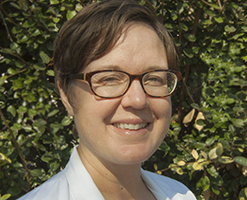 Anyone experiencing heavy periods, painful cramping, irregular cycles, and fertility issues has likely heard the word endometriosis. This diagnosis is made when tissue similar to the inner lining of the uterus, or the endometrium, grows outside the uterus in places like ovaries, fallopian tubes, the outer surface of the uterus, and connective tissues that hold the uterus in place. On very rare occasions, endometrium has been found in the lung, airway, and even in the brain.
Anyone experiencing heavy periods, painful cramping, irregular cycles, and fertility issues has likely heard the word endometriosis. This diagnosis is made when tissue similar to the inner lining of the uterus, or the endometrium, grows outside the uterus in places like ovaries, fallopian tubes, the outer surface of the uterus, and connective tissues that hold the uterus in place. On very rare occasions, endometrium has been found in the lung, airway, and even in the brain.
Let’s pause for a second and understand the uniqueness of this pathology. Actual uterine tissue is found outside of the uterus. Think if lung or cardiac tissue were found in another area of your body. The first obvious question would be how did that get there?
If this isn’t mystery enough, this endometrial tissue actually responds to hormonal changes throughout a woman’s monthly cycle. Microscopic tissue examination characterizes the misplaced endometrial tissue, finding it responds to estrogen and progesterone as well as prostaglandins (inflammatory chemical signals).
The most widely accepted hypothesis for how this tissue gets misplaced is that endometrial cells leak out the fallopian tubes during menstruation. This retrograde or back flow of menstrual tissue through the fallopian tubes is common during menses. The idea is that these cells somehow can set up within the non-uterine tissue, but exactly how is still unexplained. Other ideas suggest that endometrial cells are actually transplanted in circulatory or lymphatic flow, or that early embryonic cells implant in unusual locations.
As years roll on and pathology progresses, the uterine lining itself becomes scarred and adhesions around the fallopian tubes and ovaries form, which can also involve the bowel, bladder, and abdominal cavity. Ovulation and pregnancy become difficult. In fact, endometriosis is a major contributing factor for infertility.(1) The bowel adhesions can cause bowel strangulation, obstruction, or rupturing, all life-threatening digestive emergencies.(2)
Managing endometriosis through diet
As you can see, managing endometriosis is very important for fertility and overall health. Regardless of how the condition originates, management is successful when addressing two main areas–hormonal health and moderating inflammation pathways that signal up the scar tissue and adhesions.
One thing we do know is that inflammation from the small intestine and large intestine greatly aggravates endometriosis. Avoiding common inflammatory foods like gluten, dairy, cane sugar, and carbonated beverages, as well as harmful habits like tobacco and alcohol usage greatly resolves pain and heavy bleeding. This tells us that inflammation is a major trigger in the pathophysiology of disease progression. Your best anti-inflammatory is to stop eating the Standard American Diet and adopt a diet rich in vegetables, pasture-raised non-feedlot meats, fiber, and minimal grains and sugar. You can supplement your diet with fruit, so long as you are eating more vegetables than fruits.
Supplementation support
In addition to diet changes, utilizing supplemental support is vital. Three main supplements have published data for treatment options–N-acetyl cysteine, alpha lipoic acid, and bromelain. In a 2018 study, women with endometriosis treated with these supplements showed significant improvement in their fertility, lowered pelvic pain, and were able to decrease dependency on NSAIDS and other pain-relieving medications.(3)
N-acetyl cysteine (NAC) is a glutathione precursor, the body’s major anti-inflammatory. Because inflammation is fuel to the fire in endometriosis, NAC helps the liver get through the inflammatory process. In addition, on the cellular level, NAC helps healthy cell growth and proliferation, improving the endometrial lining and preventing scarring.
Alpha lipoic acid (ALA) is an antioxidant that is also used to support cell energy. The endometrial lining is a tissue that has rapid turnover. Think of the menstrual period and how the lining is sloughed and rebuilt each month. With inflammation over time, oxidative stress on rapidly growing tissue leads to the scar and adhesion tissue. Supporting with a powerful antioxidant like ALA helps promote healthy, normal endometrium.
Bromelain is a protein-digesting enzyme that is used to help resolve scarring and adhesions. In studies, bromelain has been shown to regulate a variety of pro-angiogenic growth factors with various wounds and damaged tissues.(4) This means it helps make healthy tissue grow, making it supportive for endometriosis.
Because the endometrium is always getting signals from hormones and prostaglandins, managing hormones is pivotal to managing endometriosis. Often women have too much estrogen and not enough progesterone. Estrogen signals the thickening of the endometrium while progesterone vascularizes the tissue. With low progesterone, heavy bleeding and painful passing of clots is typical during a menses. Having advanced hormonal evaluations through blood, saliva, or urine is the best way to determine what hormone support the body needs. DUTCH and DiagnosTechs are common companies that do specialty hormone testing.
Clear origin of the pathophysiology of endometriosis is still guesswork at best, making treatment options more band-aids rather than real cures. However, understanding the nature of endometriosis offers the best insights for truly relieving pain and heavy periods as well as offering the best chance at a healthy pregnancy. While endometriosis may never fully resolve, learning to live with the condition is very successful when implementing these supplements and diet changes.
 Amy Nelson, ND* received her Naturopathic Doctorate from the National College of Natural Medicine in Portland, OR where she studied nutrition, homeopathy, herbal and functional medicine. In addition, Dr. Nelson was the Associate at The IBS Treatment Center in Santa Monica where she treated irritable bowel syndrome and complex food allergies. Dr. Nelson utilizes her experience in natural medicine to address female and male hormonal imbalances, mental health, and digestive disorders. Amy is available for consultation at Peoples North.
Amy Nelson, ND* received her Naturopathic Doctorate from the National College of Natural Medicine in Portland, OR where she studied nutrition, homeopathy, herbal and functional medicine. In addition, Dr. Nelson was the Associate at The IBS Treatment Center in Santa Monica where she treated irritable bowel syndrome and complex food allergies. Dr. Nelson utilizes her experience in natural medicine to address female and male hormonal imbalances, mental health, and digestive disorders. Amy is available for consultation at Peoples North.
*Although licensed in other states, Naturopathic Doctors are not currently licensed in Texas.
If you have comments and/or questions about this blog, email us at blog@peoplesrx.com.
1. Bulletti C, Coccia ME, Battistoni S, Borini A. Endometriosis and infertility. J Assist Reprod Genet. 2010;27(8):441-447. doi:10.1007/s10815-010-9436-1
2. Wolthuis AM, Meuleman C, Tomassetti C, D’Hooghe T, de Buck van Overstraeten A, D’Hoore A. Bowel endometriosis: colorectal surgeon’s perspective in a multidisciplinary surgical team. World J Gastroenterol. 2014;20(42):15616-15623. doi:10.3748/wjg.v20.i42.15616
3. Lete I, Mendoza N, de la Viuda E, Carmona F. Effectiveness of an antioxidant preparation with N-acetyl cysteine, alpha lipoic acid and bromelain in the treatment of endometriosis-associated pelvic pain: LEAP study. Eur J Obstet Gynecol Reprod Biol. 2018 Sep;228:221-224. doi: 10.1016/j.ejogrb.2018.07.002. Epub 2018 Jul 6. PMID: 30007250.
4. Mataro I, Delli Santi G, Palombo P, D’Alessio R, Vestita M. Spontaneous healing and scar control following enzymatic debridement of deep second-degree burns. Ann Burns Fire Disasters. 2017;30(4):313-316.
